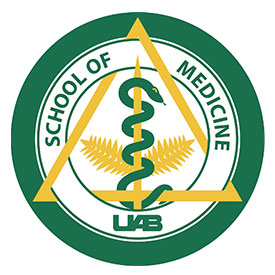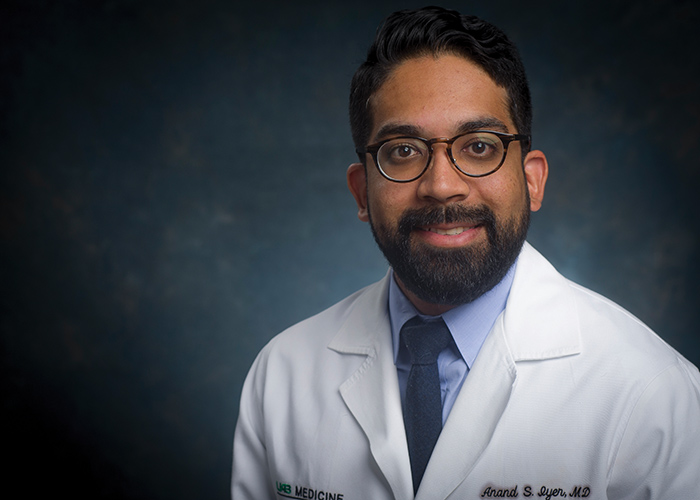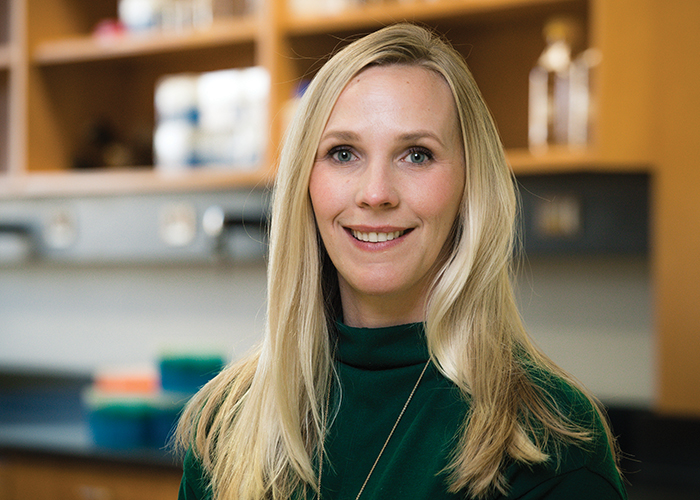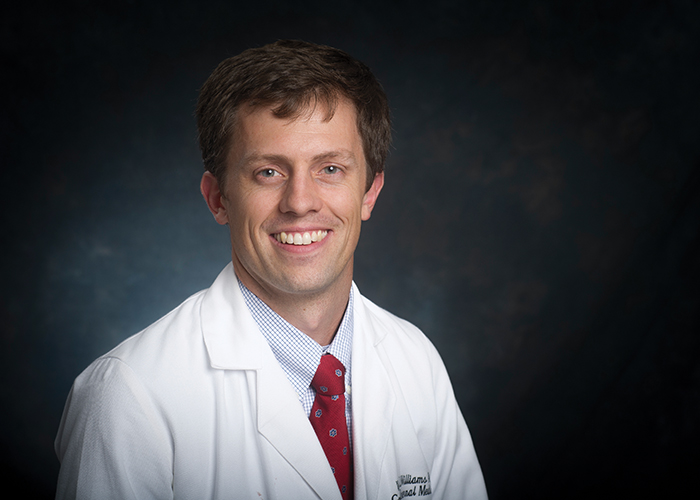 Each year, UAB and the School of Medicine honor outstanding faculty through a variety of awards. Among the winners are numerous School of Medicine and Joint Health Sciences graduates who carry on UAB’s tradition of excellence in their professional lives as clinicians, researchers, and educators. Here we meet a few alumni whose talents and commitment to care and teaching have been honored in recent years.
Each year, UAB and the School of Medicine honor outstanding faculty through a variety of awards. Among the winners are numerous School of Medicine and Joint Health Sciences graduates who carry on UAB’s tradition of excellence in their professional lives as clinicians, researchers, and educators. Here we meet a few alumni whose talents and commitment to care and teaching have been honored in recent years.
An Artist in Medicine
Medicine was woven into the upbringing of Anand Iyer, M.D., MSPH—his father has a family practice in Anniston and Gadsden, and his mother runs the clinic. Indelible childhood experiences gave Iyer, a three-time UAB graduate (2007 College of Arts and Sciences, 2011 School of Medicine, 2018 School of Public Health), youthful insights into an ongoing problem for many Alabamians. “My dad sees a primarily rural population,” Iyer says. “He would take his black medicine bag out and sometimes come back with tomatoes, or ‘maters,’ pies, or vegetables as payment. Seeing him reach out to people who were isolated in their homes is where it all started for me.”
That early education contributed to Iyer, an assistant professor in the Division of Pulmonary, Allergy and Critical Care Medicine, receiving the UAB National Alumni Society’s Young Alumni Rising Star Award in 2017 and the Outstanding Young Alumni Award in 2018. Witnessing rural Alabamians’ health care challenges motivated Iyer to step up to address them. He rebuilt the pulmonary clinic at Cooper Green Mercy Health Services to provide pulmonary care for hundreds of Jefferson County citizens and also conducts research at the interface of geriatrics, palliative care, and pulmonary medicine.
 Anand Lyer“In my research, I am trying to bring proactive geriatrics-palliative care to people with pulmonary problems in their homes or over the telephone. So that arc of reaching out to somebody in the home and seeing how much that improves quality of life is an integral part of what I am doing,” Iyer says.
Anand Lyer“In my research, I am trying to bring proactive geriatrics-palliative care to people with pulmonary problems in their homes or over the telephone. So that arc of reaching out to somebody in the home and seeing how much that improves quality of life is an integral part of what I am doing,” Iyer says.
Iyer’s background as an accomplished pianist also played a vital role in his clinical development. Although not a music major (he was recruited to UAB’s Early Medical School Acceptance Program and the University Honors Program in 2003), Iyer was mentored by Yakov Kasman, a distinguished professor and artist-in-residence in the Department of Music. Iyer recalls toting a keyboard up to the geriatric unit at UAB Hospital and playing jazz for patients’ music therapy. “Focusing on palliative care to improve quality of life for people living with serious chronic respiratory diseases is outside of the box for a physician in pulmonary medicine, but this holistic thinking probably came from my training in the arts,” he says.
Those family ties and educational experiences across multiple disciplines gave Iyer the drive to provide care for patients in both rural and urban areas. “A lot of my advocacy is for older patients with COPD,” Iyer says. “I think there is also a mentoring role for me in teaching residents and medical students about what palliative care can offer these patients.”
Risk and Reward
When Cristin Gavin, Ph.D ’12, made a “risky move” away from academic science to help build a new program at UAB, she knew she had a solid foundation to help her maintain her footing. Gavin received her doctorate in neuroscience from UAB while training remotely at The Scripps Research Institute in Jupiter, Florida.
Gavin, an assistant professor in the Department of Neurobiology, is the co-director of the Undergraduate Neuroscience Program, a collaboration that launched in 2008 between the Department of Neurobiology in the School of Medicine (SOM) and the Department of Psychology in the College of Arts and Sciences (CAS). “That has been a new challenge of bringing undergraduates into our world in the Joint Health Sciences in the School of Medicine,” Gavin says. “We have not always had a rich undergraduate presence in our labs and our courses, but that has really been a paradigm shift for our faculty.”
It is a different set of challenges from the ones Gavin gravitated to as an undergrad at Birmingham-Southern College, where she pursued degrees in philosophy and biology. Those two disciplines intersected in neuroscience.
 Cristin Gavin“What led me to neuroscience was thinking about the concrete system that exists in science and all of the higher order thought, reason, and cognition that comes from the established biological structures,” she says.
Cristin Gavin“What led me to neuroscience was thinking about the concrete system that exists in science and all of the higher order thought, reason, and cognition that comes from the established biological structures,” she says.
The switch to program builder led Gavin to winning a 2019 Dean’s Excellence Award for Teaching. Helping build an undergraduate-focused collaboration between the SOM and CAS enabled her to work with experts across UAB’s campus.
“I have spent a lot of time interfacing with many different people who I would never have the opportunity to come in contact with in my job as a scientist or a member of the neurobiology faculty,” Gavin says. “It has made UAB’s huge, rich environment seem so much more familiar and immediate.”
Gavin’s ties to UAB reach back to her childhood. She is a Birmingham native, and both of her parents are UAB graduates. As a nurse, Gavin’s mom provided care for former Gov. George Wallace when he was shot on the campaign trail in 1972. “He convinced her to apply to UAB’s physician assistant program,” Gavin says. “She did that before becoming a CRNA. She and my dad met in the program.”
Helping shape the Undergraduate Neuroscience Program is a scenario Gavin says is unique to UAB. “They are so open to innovation,” she says. “They were willing to take a risk on something that may or may not work. As long as I put thought, organization, and good plans into place, they were willing to try something new.”
Learning by Doing
As Winter Williams, M.D. ’09, became an educator and care provider, he counted on a hands-on plan for success. “My training before joining the faculty included rigorous patient care exposure, which informs my focus as a clinician-educator on experiential learning—the chance to learn by doing,” Williams says. “Whether in the clinical setting or simulation activities, I hope to teach students and residents a hands-on approach to the complexity of medicine, including how to effectively interact and communicate with patients.”
 Winter WilliamsWilliams’ focus on experiential learning has paid off, for both him and the students and residents with whom he works. An assistant professor in the Department of Medicine, Williams won a 2019 Dean’s Excellence Award for Teaching.
Winter WilliamsWilliams’ focus on experiential learning has paid off, for both him and the students and residents with whom he works. An assistant professor in the Department of Medicine, Williams won a 2019 Dean’s Excellence Award for Teaching.
Long before becoming a faculty member, Williams saw his father serve as a small-town surgeon in McComb, Mississippi. To make sure a medical career was the correct path, Williams evaluated the patient care environment on his own.
“I got exposure to medicine early, but my parents did not push me in that direction,” Williams says. “They let me find my own way, which was critical in me discovering my own passion for medicine. After college, I worked as an emergency room technician for several months to ensure it was the right fit for me, and it confirmed my love of patient interaction and medicine as a whole.”
Williams draws on those experiences for one of the most gratifying aspects of his job: advising students who are making decisions about their own careers and applying for residencies. And he is not above seeking out advice from peers and colleagues when he needs it.
“I have an incredible group of colleagues in the Division of General Internal Medicine that have taught me so much,” he says. “They have filled that mentor role for me, and it has been rewarding to have a chance to pay that forward for the benefit of our students.”
By Brian Hudgins